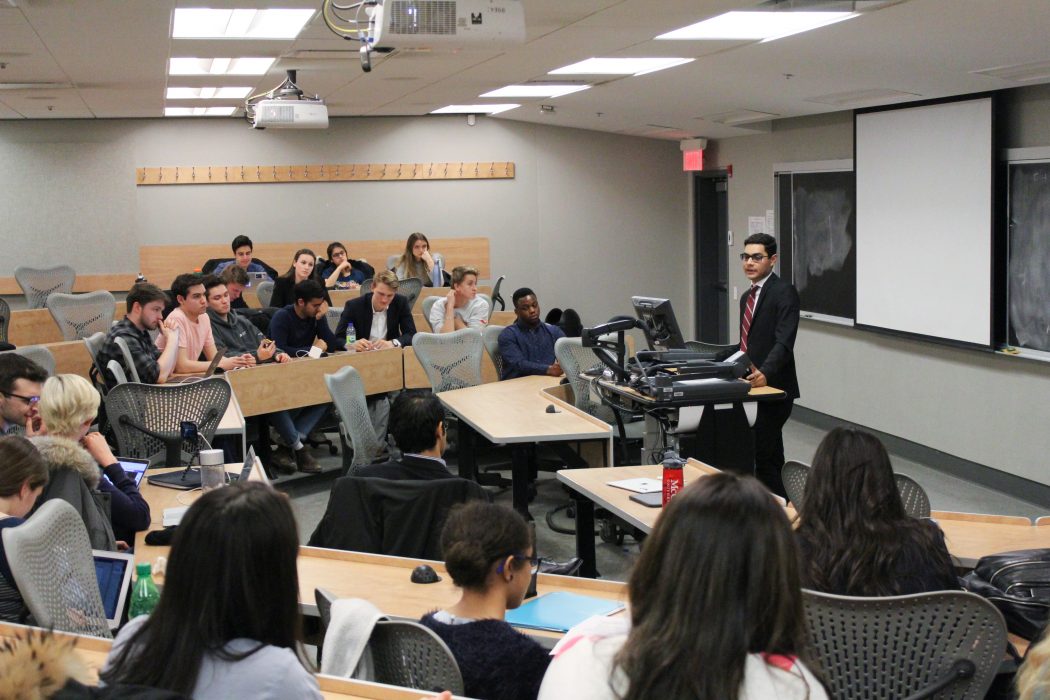On February 5, the Management Undergraduate Society hosted debates for its 2018 MUS Board of Directors elections candidates. The debates were moderated by Desautels student and MUS Chief Returning Officer Ahmad Hassan. The Board of Directors positions include the President, Senator, two SSMU representatives, and the U1, U2, and U3 representatives.
Each of the sixteen candidates was permitted one and a half minutes to deliver their platform, and each was allowed to field two questions. Below are the candidates for each position and their respective platforms in the order that they presented at the debates.
President
Bryan Danielson is a U2 student majoring in Finance and Accounting, and is currently on exchange in Melbourne, Australia. If elected, his first initiative is to review the structure of the Management Undergraduate Society and to target inefficiencies within it in order to ensure that each MUS position operates smoothly and productively. As part of this review, Danielson aims to create a new position of VP Equity, come up with an automated booking and reimbursement system for students in the management faculty, and to implement a fall reading week for the mental wellbeing of students. Ultimately, he would be dedicated to representing all students and making sure that their interests are accounted for.
O’Nell Agossa is a U2 student majoring in Finance. If elected, one of his main goals is to streamline the Desautels Management Competitions Committee (DMCC) portfolio and improve McGill’s presence at competitions. In addition, Agossa hopes to improve collaboration between the MUS and management clubs by making sure that MUS executives are accessible for drop-in hours. He asserted that it is important to change the narrative between the MUS and clubs, so that the MUS is present to help clubs run their events rather than simply enforce policies. Finally and most importantly, Agossa wants to connect management students with a vast array of existing mental health and wellness initiatives including SSMU’s mental health and disabilities resources by “[working] with all of the student representatives so that we actually understand all the resources that are available on campus, and finding a way to relay that as best as possible to all the students here.” He would also focus on “designating an entire week to mental health, which would include workshops and guest speakers.”
Senator
Colin Donahoe is a U2 management student, and currently serves as VP Academic within the faculty. When it was his turn to speak at the debates, he immediately acknowledged that the past two MUS Senators have been impeached for not showing up to Senate meetings. Donahoe stated that if elected he “won’t get impeached, [he’ll] actually do the job.” In addition, Donohoe pointed out the importance of integrity, transparency, and accountability from everyone on the Board. He insisted that this year’s board must be dedicated to their promises and to the students, assuring that he will “hold everybody else on the Board to that high standard. I want to make sure that this year people follow through on the pledges and promises that they make.”
SSMU Representative
Miller Cressman stated in his opening remarks: “I believe that my changes with regards to accessibility and involvement, coupled with my enthusiasm, will be able to revitalize the relationship between the MUS and the SSMU.” If elected, his goals are to provide students access to SSMU materials relevant to the MUS, such as through an email list, to open a two-way platform for communication concerning student thoughts on SSMU affairs, and to host a SSMU involvement night specifically for management students to promote MUS involvement in SSMU. According to Cressman, this increased involvement in SSMU would lead to an increase in management students’ attendance at SSMU General Assemblies. When asked why management students should keep up with SSMU affairs and engage with SSMU, Cressman replied: “We pay more in fees to SSMU than we actually pay to the MUS, so I think we should take advantage of all the resources that they offer.” Ultimately, Cressman aims to prioritize SSMU governance reforms that are important to management students, and allow Desautels to “be heard in the broader McGill context.”
Benjam Smit is running for SSMU Representative in order to improve communication between SSMU and the MUS, and to take advantage of opportunities that exist within SSMU. He noted that “throughout my experience, I’ve found that the voice of the Desautels community has frequently gone unheard and unaccounted for within SSMU. Our faculty does not lack ideas, but frequently those ideas are not communicated effectively to the broader SSMU body.” In order to effectively solve the existing communication problems, Smit will take a three-pronged approach: being present at legislative council meetings, and sharing resultant discussion with the greater management community, running for a position on the funding board of SSMU in order to increase financing opportunities for MUS clubs and “bridge the divide that has previously not been capitalized on” between SSMU and the MUS, and increasing transparency between the Board of Directors and management students by distributing Board of Directors meeting minutes and holding bi-weekly office hours where students can voice their opinions.
Brooke Callaghan is a second year student who is double majoring in Finance and Accounting. Her platform is built on three critical points, the first of which is mental health. Callaghan noted that Desautels has the least amount of funding for mental health initiatives. This, combined with the competitive environment that exists within the management faculty, leads her to believe that the number of mental health initiatives needs to be increased to mitigate this stress. Her second mission is to reconcile Desautels’ interests with SSMU’s agenda. She stated that “the inherent purpose of SSMU has been lost in animosity,” and that ultimately, SSMU and the MUS both aspire to improve students’ lives. She hopes to work with the MUS VP Communications to survey students about what they want from SSMU. Finally, Callaghan wants to implement financial reform. She is eager to work with the SSMU VP Finance to prevent any misuse of student finances and any lack of transparency.
Charlotte Marmonier opened the discussion of her platform by addressing the theory-based course curriculum in many management classes. She noted the importance of guest lecturers in the Desautels curriculum to supplement typical lecture and textbook material, and to help students see how their lecture information applies to the real world. One of her main goals is to create a rest area on the third floor of Bronfman to help students deal with the exhaustion and stress that comes with university life, explaining that “it really doesn’t take much to have a private zone, or an area to relax.” While Marmonier has not been involved specifically with SSMU or the MUS, she maintained that her experience on other committees within Desautels has given her the insight and knowledge to be a successful representative for management students.
Alessio Marcogliese’s platform is based on a specific plan to reform SSMU governance. The first part of this plan is to implement financial reform in order to make sure that finances are spent efficiently and that no “fat cats” get away with any funds. When asked how he will implement financial reform when he is only one voice on an entire legislative council, Marcogliese was adamant that he is dedicated to advocating for fiscal responsibility within SSMU, and that one voice can still be effective in bringing about change. He stated that within SSMU “there is not even a revenue problem, there is a spending problem,” in that SSMU resources are not efficiently allocated. Next, Marcogliese stressed the importance of modernizing SSMU culture, pointing to the “infighting and bullying” that he has witnessed within SSMU. He believes that his leadership experience and ability to make change happen makes him the perfect candidate to tackle this issue.
U1 (Second Year) Representative
Tarush Maniktala, a U0 management student, believes that his experience living in many different cities has given him a unique perspective with regards to diverse backgrounds and equal opportunities – experience that he hopes to bring to the U1 representative position. As a member of the first-year involvement team he is aware of how the MUS runs, including the operation of the Board of Directors and the Executive team. One of his goals as U1 Representative is to provide a benefits card for management students. He confirmed that doing this would not interfere with the initiatives of the SSMU Corporate Relations Team, which also works with businesses to get sponsorships for clubs and events. Maniktala also wants to create a more concentrated working environment within Bronfman, adding more chairs, tables, and charging stations within the building, and would work to establish a break room where students can de-stress and attend to their mental health and wellbeing.
Daniela Garabito Silva outlined three proposals that make up her platform, the first being sustainability. She affirmed that events like Carnival and Frosh are “trademark events” of the MUS, but are still far away from reaching sustainable and equitable standards. Silva, if elected, would look into implementing fair trade T-shirts, organic alcohol, and plastic compostable cups for these events. In response to inquiries regarding the inclusivity of these events, Silva stressed the importance of communicating to students that these are not solely drinking events, but rather fun events for all regardless of whether students choose to consume alcohol. Her second proposal is to expand the MUS to include tutorial services, as Silva believes that MUS tutoring “would allow U1 students to get the help they need throughout the year, and not just before a final examination.” Her third proposal is to increase involvement opportunities for younger students. While U0 and U1 students are allowed to join management clubs, these clubs only accept about forty students each, which makes it more difficult to get involved. Silva would increase the capacity of each club in order to give U0 and U1 students more opportunities to participate and become engaged in the MUS early on.
U2 Representative
Leo Gelfand strives to “emphasize student wellness, opportunity, and accountability, to provide all of us with a positive and fulfilling U2 experience.” The first point he presented as part of his platform was his dedication to the mental wellbeing of management students: “Nobody can thrive academically or socially when they don’t feel safe and comfortable, so I plan on making mental health and wellness my top priority.” Gelfand plans to do this by putting together a Desautels mental health task force, which would be comprised of students of different ages, backgrounds, genders, and perspectives, and would seek to understand the nature of student mental health through surveys that examine student needs. Another of Gelfand’s goals is to make fall employment recruitment less intimidating for U2 students. Working with VP Communications, he would send out information to U2 management students regarding job opportunities, information sessions, and other recruitment deadlines.
Sascha Fawaz confidently outlined the three main points of her platform: female empowerment, health, and support. With regards to female empowerment, Fawaz was clear in her stance: “When I say women empowerment I am not talking about outnumbering men, I am talking about equality and equal representation, because both of these communities have different needs that have to be addressed.” Fawaz also pointed out that healthy food alternatives need to be in place when Bento and Quesada are closed, such as vending machines that include healthy options. Lastly, Fawaz stressed that she would be an available support system for every student she would be representing: “I am here to support all students regardless of the community to which they belong. I am not only here to support women, but everyone. Whoever has a problem, I am here to find the solution.”
Anne Sophie Levee began her time at the debate by handing out images of possible Desautels apparel designs, and exclaiming that “fake news may be the trend these days, but fake promises have plagued student unions for way too long.” While past and ongoing attempts to get apparel approved have experienced roadblocks, Levee is confident that the research she has done will allow her to find alternatives and get Desautels apparel to sell. Along with fostering a collective Desautels identity with apparel, Levee structured her platform on improvements to student life through simple measures such as making more microwaves available in Bronfman and awareness of the MUS. Levee expressed her surprise at some of the statements she has heard from other management students: “When I was looking for signatures, more than three quarters of the people asked me, ‘what’s the Board of Directors?’… It’s not normal that the students at Bronfman don’t know that they are being represented.” She hopes to solve this problem by posting clear visual aids in Bronfman that will help students become aware of the resources available to them through the MUS.
Jillian Weisleder described her platform’s three parts, which include implementing more technology, empowering women, and giving the student body what they really want. “This means more tables and chairs on the second floor, creating online assistance to make life easier, and providing opportunities for both male and female students to feel that they have the chance to excel.” Weisleder explained the importance of online platforms and surveys through which students can connect directly to the Board of Directors, acknowledging that she “knows surveys aren’t very fun, but it’s a chance for a student to create real change. I want to create a real bond between the students and the board, and I want to give students the chance to better their own experience.” Weisleder is also dedicated to cultivating empowerment for women in the management faculty. She will work to create a program with Desautels Women in Business that would implement bi-weekly workshops. These gatherings would give women in Desautels a time and place to “talk about the pressure that comes with being a woman in this faculty,” resources to prepare for interviews, and opportunities to speak with alumni.
U3 Representative
Quentin Amaudry has one central aspect of his platform: to improve communication, as the information distributed to students about the MUS is too disorganized and needs to be centralized. The simple solution that he will work towards on the Board of Directors is a Bronfman Life application, which would be a completely separate entity from the mobile-compliant MUS website. The benefits of the app would include direct daily advertisements of management events for students, the possibility of allowing students to make payments through the app at events such as 4à7, and more. Amaudry is already in contact with a firm about the app, and while developing it would take time and money, he asserted that the long-term benefit to the MUS community would be worth it. Amaudry is certain that his ideas “will spark real change,” and wants to make a difference in the Desautels community.
Bogdan Tanasie was previously part of the first-year involvement team within Desautels and is currently VP Communications on the Executive Council. Because of this, he believes that he has the experience to effectively listen to students and bring significant changes to Desautels. If elected, Tanasie plans to implement high-level changes to the MUS to make sure that the Board and the MUS Executives are responsive to student needs. Tanasie’s goals for his platform are to enhance student life, and to “align the strategic values of the MUS with [student] values.” As for student life, Tanasie discussed the importance of making sure various management events can continue to be held in the future. Tanasie also discussed the space improvement fund, which was used to renovate the fourth floor, and stated that he would use the remaining funds to keep improving the management community. Tanasie emphasized that it is crucial that management students vote for their Board of Directors candidate regardless of who they select, but concluded that he has the necessary experience to successfully represent U3 students.
Elections will be held from February 8 to February 10, and all undergraduate management students are encouraged to vote for their MUS Board of Directors.
























